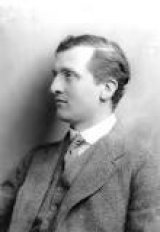Analysis of Mana Aboda
T. E. Hulme 1883 (Endon) – 1917 (Oostduinkerke)
Beauty is the marking-time, the stationary vibration, the feigned ecstasy of an arrested impulse unable to reach its natural end.
Mana Aboda, whose bent form
The sky in archèd circle is,
Seems ever for an unknown grief to mourn.
Yet on a day I heard her cry:
'I weary of the roses and the singing poets—
Josephs all, not tall enough to try.
| Scheme | X XXXAXA |
|---|---|
| Poetic Form | |
| Metre | 101010101000100110011010100101111001 101111 01011101 1101101111 11011101 1101010001010 101110111 |
| Closest metre | Iambic heptameter |
| Characters | 337 |
| Words | 63 |
| Sentences | 3 |
| Stanzas | 2 |
| Stanza Lengths | 1, 6 |
| Lines Amount | 7 |
| Letters per line (avg) | 38 |
| Words per line (avg) | 9 |
| Letters per stanza (avg) | 133 |
| Words per stanza (avg) | 32 |
Font size:
Citation
Use the citation below to add this poem analysis to your bibliography:
Style:MLAChicagoAPA
"Mana Aboda" Poetry.com. STANDS4 LLC, 2024. Web. 29 Apr. 2024. <https://www.poetry.com/poem-analysis/54155/mana-aboda>.


Discuss this T. E. Hulme poem analysis with the community:
Report Comment
We're doing our best to make sure our content is useful, accurate and safe.
If by any chance you spot an inappropriate comment while navigating through our website please use this form to let us know, and we'll take care of it shortly.
Attachment
You need to be logged in to favorite.
Log In